* games played is as of the beginning of this season when this article was originally produced
There was certainly a large disparity of first-round talent drafted in the 2000s.
Some teams, like the Pittsburgh Penguins, drafted franchise cornerstones such as Sidney Crosby, Evgeni Malkin, and Marc-Andre Fleury at the top of the draft. Other teams, such as the Buffalo Sabres, found talent such as Thomas Vanek, Tyler Myers, and Keith Ballard later in the first round.
Related: The Sedin Twins and the 1999 NHL Entry Draft
Like many teams, the Sabres also struck out on first-rounders Artem Kryukov, Marek Zagrapan, and Denis Persson. Their 2000s draft results are similar to many teams. Most franchises found some talent in the first round while striking out on others.
The Canucks are no different, with their nine first-rounders in the 2000s covering all ends of the spectrum.
9. Patrick White (2007, 25th overall)
0 NHL games played.
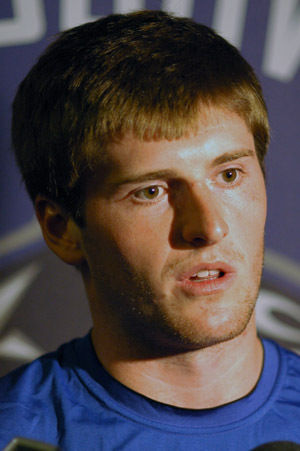
Patrick White is certainly biggest first-round disappointment for the Canucks during the 2000s. The Minnesota native, who was voted the 2007 Associated Press Minnesota High School Hockey Player of the Year, was one of five first-rounders that year to never reach the NHL.
One of those players was Alexei Cherapanov, the New York Rangers prospect who tragically passed away after collapsing on the bench. The other three at least saw some AHL time before failing to make the NHL. White, on the other hand, never came close.
His production tailed off with the Minnesota Gophers in the NCAA, and really he never came close to cracking the NHL. Mike Gillis realized Dave Nonis’s draft day mistake early on, and shipped White to the Sharks in a package for Christian Ehrhoff. While Ehrhoff thrived in Vancouver, White never made it higher than the KHL in his hockey career.
In his one season playing for the KHL’s Bratislan Slovak, he failed to register a point in 26 games. He last played for Dijon in Div. 1 of the Ligue Magnus (France) in 2016-17.
David Perron was selected right after White at 26th overall, while impact players such as P.K. Subban and Wayne Simmonds were selected in the second round of that draft.
8. Nathan Smith (2000, 23rd overall)
26 NHL games played (0-0-0)
The good news? Nathan Smith ended up playing 26 more NHL games than Patrick White. The bad news? Smith and White are tied in career NHL points.
Smith actually played 490 career games in the AHL , popping briefly into NHL action in five different seasons. He made his two-game NHL debut with the Canucks in 2003-04, before playing two more games for the franchise in 2005-06 and 2006-07. Smith then saw 13 games with Pittsburgh in 2007-08, before playing nine more games with Minnesota in 2009-10.
At his peak, Smith was a top-six, two-way centre at the AHL level. The AHL was never supposed to be his peak, but he was billed as a two-way centre when he was drafted by the Canucks.
The scouting staff saw value in a player of this mold, and passed on a more prolific junior scorer, Brad Boyes, who was selected by the Toronto Maple Leafs next at 24th overall. Vancouver also passed on players such as Steve Ott, Justin Williams and Niklas Kronwall, who were selected before the end of the first round.
7. Jordan Schroeder (2009, 22nd overall)
165 NHL games played (18-24-42)
In another draft miss by the Gillis administration, Jordan Schroeder was always pegged as a guy who needed to play in the top six in order to be successful. Unfortunately for Schroeder, his talent level wasn’t high enough to catapult him into that role.
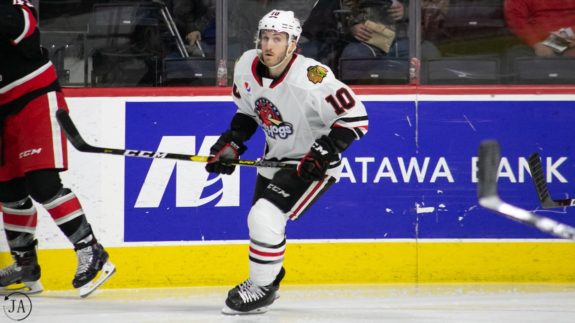
The Canucks gave him a couple of opportunities from 2012 to 2014, playing him 14-15 minutes per night. However, he just wasn’t able to generate offence on a consistent basis. By the time he got to Minnesota, he was only used as a fourth-line, replacement-level, player.
He was recently reunited with John Tortorella in Columbus, and played 21 games (1-1-2) for the Blue Jackets last season. Torts coached Schroeder previously in Vancouver, but by this point in his career, his role is already defined. He did have a career-best 36 points in 48 games for the Blue Jackets AHL affiliate, the Cleveland Monsters, last season.
There were some equally ineffective players such as Tim Erixon (23rd overall) and Jordon Caron (25th overall) drafted after Schroeder. The Canucks did pass on Marcus Johansson (24th overall), and missed out on Ryan O’Reilly (33rd overall) as well.
6. Cody Hodgson (2008, 10th overall)
328 NHL games played (64-78-142)
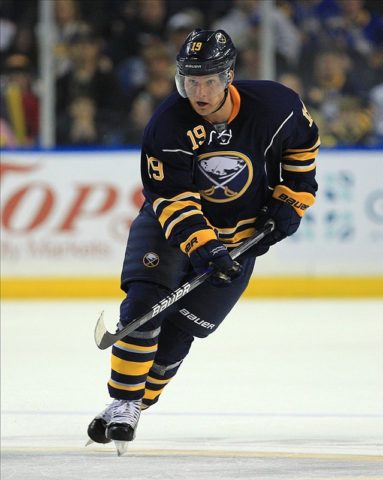
Cody Hodgson was once on track to become the Canucks best first round pick since they selected the Sedin twins in 1999. First-line centre potential oozed out of his game early in his career after the draft. He really put his name on the map with 16 points in six games at the 2009 World Juniors, when Canada beat Sweden for gold. Hodgson led the tournament in scoring, and outscored teammates such as John Tavares, Jordan Eberle, Jamie Benn, P.K. Subban and Evander Kane among others.
However, things quickly came off the rails for the former junior star. He showed promise during limited minutes in Vancouver, but was shipped out of town after Gillis talked about Hodgson’s constant complaints. “”I spent more time on Cody’s issues than every other player combined on our team the last three years,” is what Gillis famously told Postmedia shortly after the trade.
Perhaps karma came back to bite the young star, who had two good years in Buffalo before suffering through a dreadful 2014-15 campaign. He was expected to be the Sabres top centre at one point, but registered only 13 points in 76 games in 2014-15. Hodgson played for one more season in Nashville before calling it quits at the age of 26.
It was a strange career arc indeed, but you can’t fault the Canucks for making this selection. There were a plethora of busts and mediocre players in the first round of that draft. In terms of players drafted after Hodgson in round one, only Erik Karlsson, Tyler Myers, Jake Gardiner, Jordan Eberle and John Carlson went on to become impact NHL players.
5. Michael Grabner (2006, 14th overall)
640 NHL games played (175-101-276)
Following in the footsteps of Vanek, Grabner became one of the highest-drafted Austrians of all-time at 14th overall in 2006. However, he only suited up for 20 games in a Canucks uniform, before Gillis shipped him to the Panthers in an ill-fated trade that brought back Ballard.
Florida made an even bigger mistake by waiving the Austrian prior to the 2010-11 season. He was then picked up by the Islanders, and went on to register 34 goals and 52 points as a rookie. Grabner was named a Calder finalist that season, although both those totals remain career highs for the Arizona Coyote. He is currently an unrestricted free agent.
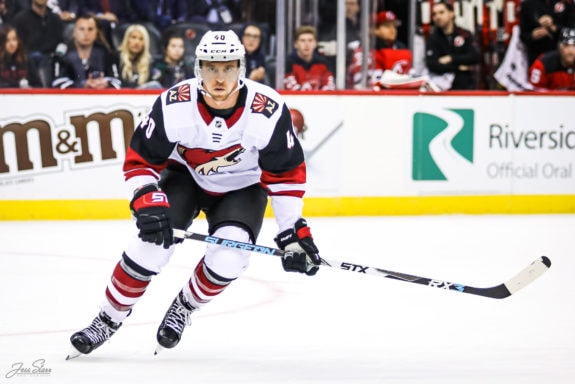
It was a matter of bad timing for Grabner in Vancouver when Gillis shipped him out of town. The streaky forward didn’t fit into the Canucks top-six, and Gillis made the call that defensive depth was more important. He ended up being right, although Ballard’s time in Vancouver was riddled with injuries and inconsistencies.
Some much less impressive names were selected after Grabner in the first round, but Claude Giroux (22nd overall) stands out as the steal of that draft.
4. R.J. Umberger (2001, 16th overall)
779 NHL games played (180-212-392)
Well, you can’t really complain about the selection of R.J. Umberger at 16th overall in 2001. He played more NHL games than anyone else drafted after him in the first round of the 2001 NHL Entry Draft.
The fact that he never played a game for the Canucks is another story entirely. Umberger’s former Ohio State teammate, Ryan Kesler, was also drafted by the Canucks in 2003. Kesler signed his contract with the Canucks before Umberger, and Umberger’s side believed that Kesler signed a contract below market value in order to extract less from Umberger.
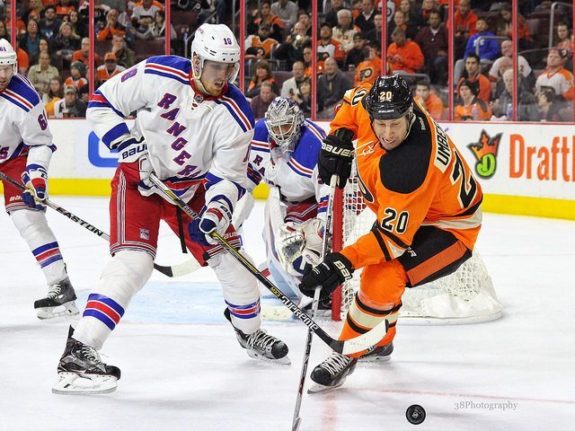
Umberger famously sat out the entire 2003-04 season, got traded to the New York Rangers, failed to sign, and signed as a UFA with the Philadelphia Flyers in the summer of 2004. At his peak, Umberger was a solid second-line player who was reliable for 50-55 points per season.
3. Luc Bourdon (2005, 10th overall)
36 NHL games played (2-0-2)
In one of the most tragic stories in Canucks history, 21-year-old Luc Bourdon tragically passed away in a motorcycle accident in 2008. It’s an event that shook the team, especially teammate Alex Burrows. Bourdon would have been 31 if he was around today, and who knows what his impact would have been in Vancouver.
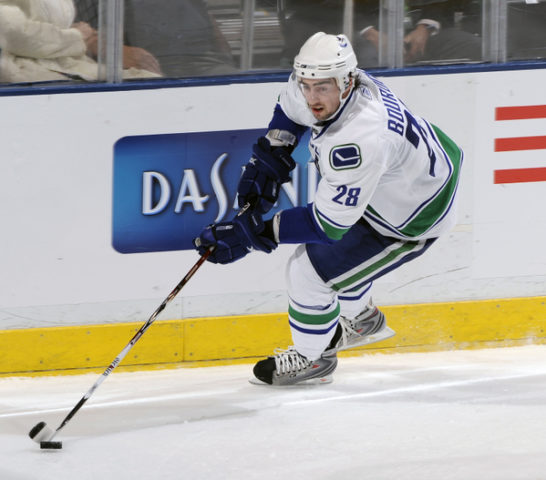
He was on track to become a reliable defender for years to come. Bourdon fared well with the Canucks in 2007-08, played 27 games while registering two goals. He was also a prolific defenceman in the QMJHL, and won a gold medal with Canada at the World Juniors in 2006. Bourdon was named the best defenceman of the tournament as well.
Bourdon’s accomplishments as a young hockey player are what will be remembered of him. In terms of notable selections after Bourdon, there is really just one that stands out. Anze Kopitar was selected by the Los Angeles Kings one pick later at 11th overall.
2. Cory Schneider (2004, 26th overall)
409 NHL games played (170 wins, 159 losses, 58 overtime losses, 2.43 GAA, .918 save percentage)
While there were varied levels of success for most of the Canucks first-round picks of the decade, two clearly stand above the rest. That starts with Marblehead, Massachusettes native Cory Schneider.
Schneider was seasoned to perfection in college and the AHL, and didn’t make his NHL debut until the fifth season after his draft. Soon thereafter, he started to push netminder Roberto Luongo for the starting job in Vancouver, after a couple of stellar seasons as his counterpart.
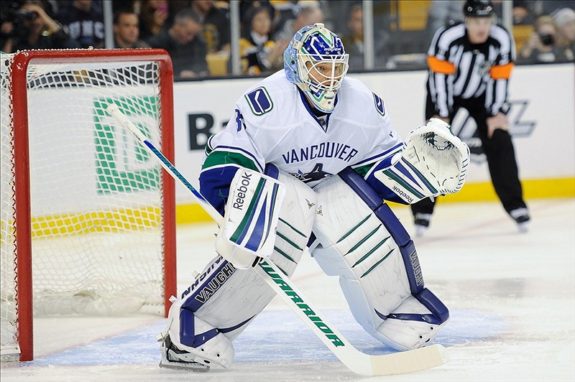
Of course, the shocking trade of Schneider to the New Jersey Devils at the 2013 draft brought back one of the Canucks best players in Bo Horvat. Schneider on the other hand, continued to put up strong numbers on a weak New Jersey squad. The last two seasons had been uncharacteristically bad for the goaltender, which resulted in the Devils buying out the remaining two seasons of his seven-year contract. He signed with the New York Islanders in the 2020 offseason but has yet to play a game for his new team.
1. Ryan Kesler (2003, 23rd overall)
1001 NHL games played (258-315-573)
One of the most infamous and rugged players in Canucks history goes down as the best first-round selection of the 2000s for Vancouver. In a stacked draft, the Canucks snagged Kesler at 23rd overall. Even though he didn’t blow the doors off to begin his NHL career, Kesler progressed into one of the most dangerous two-way centres in hockey.
Even though Kesler was the best Canucks first-rounder of the 2000s, his ascension was a rocky one. There was the aforementioned feud with Umberger and an offer sheet that almost saw Kesler join the Flyers. It wasn’t really until the 2007-08 season that Kesler really started to show signs of becoming a special player.
The peak of his Canucks career came during the 2010-11 season, where the Livonia, Michigan native scored 41 goals, almost single-handedly defeated the Nashville Predators in the playoffs, and won the Frank J. Selke Trophy.
Kesler’s relationship with the fans in Vancouver did start to sour when he demanded a trade from the club in 2014. Despite denying that he wanted to leave the club, Kesler forced general manager Jim Benning into a trade with the Anaheim Ducks. He spent five seasons with the Ducks before being placed on long term injured reserved for the remainder of his contract, likely ending his NHL career.
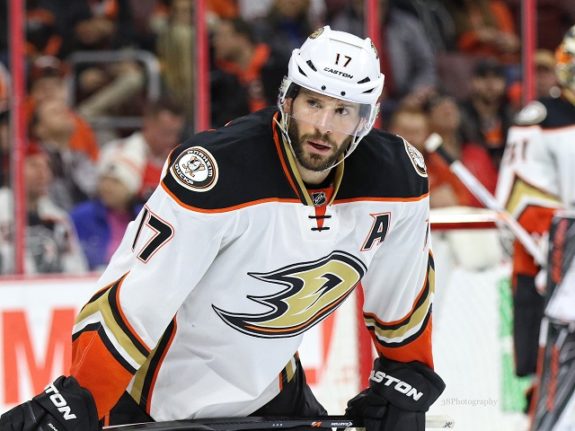
Regardless of his past with the Canucks, Kesler was easily the best first-round pick that the Canucks produced during the decade. While opinions of him in Vancouver have wavered, he did give this team 100 per cent on the ice every night during his prime. His efforts didn’t result in the Canucks bringing home a Stanley Cup, but Kesler was easily a major component of the most dominant Canucks squad in team history.
Enjoy more great hockey history and ‘Best of’ posts in the THW Archives